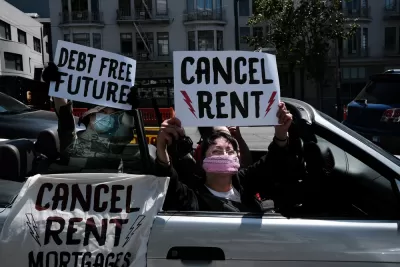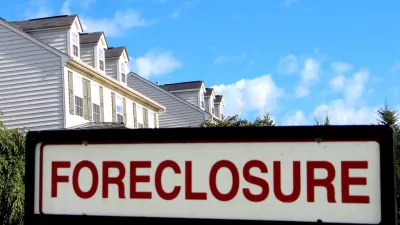Three big, but basic, things that we could do right now to get us much closer to equity in housing.

America’s housing system was never just built to create housing. It was designed to maintain racially and economically segregated neighborhoods and it rests on a long legacy of inequity, specifically anti-Black racism. In this sense, our housing system isn’t really broken. Its weakness in this moment—in the pandemic—just shows that it’s working as designed. COVID-19 is holding up the mirror, and we have an unprecedented opportunity to begin the uncomfortable process of examining, owning, dismantling, and rebuilding the inequitable system that got us here.
Through decades of housing policies and practices that have literally divided us—such as redlining and the Federal Housing Administration’s 1938 Underwriting Manual, which allowed loan denial based on race—we’ve intentionally created entire communities that are more vulnerable to crisis than others. Black Americans are still the least likely group to own homes and build generational wealth, and therefore have fewer economic protections (the homeownership gap is actually wider today than it was in the 1960s when housing discrimination was overtly legal). People of color are still overrepresented in our homeless populations and our incarcerated populations, and those most impacted by the lack of affordable housing, jobs, and quality healthcare.
When you look at where and who this pandemic is hitting hardest, it’s clear that race, place, job type, and income matter. It’s hard not to see housing—and its long threadline through history—as inextricably linked to this moment.
Housing policy helped get us here, and now housing may be another collateral consequence of the pandemic and its economic fallout. While December’s COVID relief bill provides some relief for renters and short-term protection from eviction, it does little to address the long-standing inequalities that got us here. It’s a temporary bandage. We need to leverage these short-term legislative wins as a jumping-off point to transform our housing system as a whole.
This moment now demands ...
FULL STORY: Moving from the Inequitable Housing System We Have to the Housing System We Need

Planetizen Federal Action Tracker
A weekly monitor of how Trump’s orders and actions are impacting planners and planning in America.

Chicago’s Ghost Rails
Just beneath the surface of the modern city lie the remnants of its expansive early 20th-century streetcar system.

San Antonio and Austin are Fusing Into one Massive Megaregion
The region spanning the two central Texas cities is growing fast, posing challenges for local infrastructure and water supplies.

Since Zion's Shuttles Went Electric “The Smog is Gone”
Visitors to Zion National Park can enjoy the canyon via the nation’s first fully electric park shuttle system.

Trump Distributing DOT Safety Funds at 1/10 Rate of Biden
Funds for Safe Streets and other transportation safety and equity programs are being held up by administrative reviews and conflicts with the Trump administration’s priorities.

German Cities Subsidize Taxis for Women Amid Wave of Violence
Free or low-cost taxi rides can help women navigate cities more safely, but critics say the programs don't address the root causes of violence against women.
Urban Design for Planners 1: Software Tools
This six-course series explores essential urban design concepts using open source software and equips planners with the tools they need to participate fully in the urban design process.
Planning for Universal Design
Learn the tools for implementing Universal Design in planning regulations.
planning NEXT
Appalachian Highlands Housing Partners
Mpact (founded as Rail~Volution)
City of Camden Redevelopment Agency
City of Astoria
City of Portland
City of Laramie





























